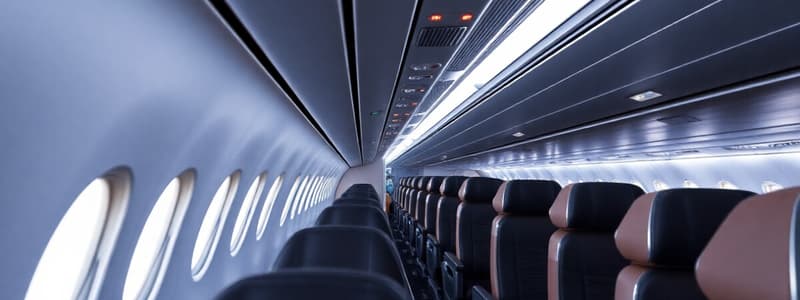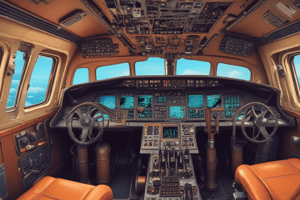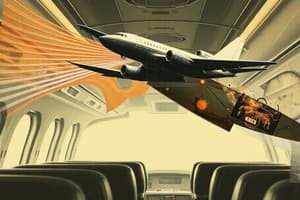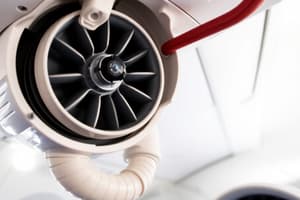Podcast
Questions and Answers
What is the primary purpose of the pressurization system in an aircraft?
What is the primary purpose of the pressurization system in an aircraft?
- To optimize engine performance
- To ensure passenger comfort and safety by regulating cabin altitude (correct)
- To maintain a constant cabin temperature
- To facilitate baggage loading and unloading
Which components are actively involved in managing cabin pressure?
Which components are actively involved in managing cabin pressure?
- Air conditioning packs and autopilot system
- Outflow valve and electronic flight instrument system
- Cockpit instruments and safety valves
- Cabin Pressure Controllers and outflow valve (correct)
During what phase of flight is the outflow valve fully open and there is no differential pressure?
During what phase of flight is the outflow valve fully open and there is no differential pressure?
- Descent
- On the Ground (correct)
- Cruise
- Takeoff
What action should a pilot take if there is a landing elevation fault indication?
What action should a pilot take if there is a landing elevation fault indication?
What is the significance of the cabin pressure monitoring on the ECAM Cabin Pressure Page?
What is the significance of the cabin pressure monitoring on the ECAM Cabin Pressure Page?
Which condition may cause the outflow valve to automatically control residual pressure?
Which condition may cause the outflow valve to automatically control residual pressure?
What adjustment is made to cabin altitude during takeoff?
What adjustment is made to cabin altitude during takeoff?
What happens to the outflow valve immediately after landing?
What happens to the outflow valve immediately after landing?
Flashcards
What is the purpose of the pressurization system?
What is the purpose of the pressurization system?
The pressurization system is responsible for maintaining comfortable and safe cabin pressure during flight. It automatically adjusts the cabin altitude to simulate a lower altitude, preventing discomfort and health risks.
Which areas of the aircraft are pressurized?
Which areas of the aircraft are pressurized?
The pressurization system operates in multiple sections of the aircraft to maintain a consistent pressure environment, including the cockpit, avionics bay, passenger cabin, and cargo compartments.
How does the pressurization system work?
How does the pressurization system work?
Air from the air conditioning packs is used to pressurize the cabin. The outflow valve regulates the amount of air escaping from the cabin, controlling the pressure inside.
What are the key components of the pressurization control system?
What are the key components of the pressurization control system?
Signup and view all the flashcards
What is the purpose of the manual mode in the pressurization system?
What is the purpose of the manual mode in the pressurization system?
Signup and view all the flashcards
What is the role of safety valves in the pressurization system?
What is the role of safety valves in the pressurization system?
Signup and view all the flashcards
What information is displayed on the ECAM Cabin Pressure Page?
What information is displayed on the ECAM Cabin Pressure Page?
Signup and view all the flashcards
What is the purpose of the cruise page in the pressurization system?
What is the purpose of the cruise page in the pressurization system?
Signup and view all the flashcards
Study Notes
Pressurization System Overview
- Purpose: Maintains comfortable and safe cabin altitude, regulating its rate of change.
- Areas Pressurized: Cockpit, avionics bay, cabin, and cargo hold.
System Design and Components
- Air Supply and Outflow Valve: Air from air conditioning packs pressurizes the cabin; the outflow valve controls air escaping.
- Control Mechanisms: Two Cabin Pressure Controllers (CPCs) manage outflow valve via electric motors (one active, one backup); a third motor for manual operation if both CPCs fail.
- Safety Valves: Located at the rear pressure bulkhead, prevent pressure from getting too high or low.
Pressurization Monitoring
- ECAM Cabin Pressure Page: Displays pack status, outflow valve position, active system controller, differential pressure, cabin vertical speed, and cabin altitude.
- Cruise Page: Simplifies in-flight monitoring of key parameters.
Operational Phases
- On the Ground: Outflow valve fully open; no differential pressure or vertical speed; cabin altitude matches airfield elevation.
- Takeoff: Pre-pressurization during roll; cabin altitude adjusts based on a fixed law as the aircraft climbs.
- Cruise: Cabin altitude and differential pressure stabilize; outflow valve adjusts to maintain these conditions.
- Descent: Automatic descent rate limited to ~750 ft/min; cabin pressure matches the landing field's pressure just before touchdown.
- Post-Landing: Outflow valve fully opens after touchdown to equalize pressure; automatic controller changeover prepares the system for the next flight.
Abnormal Conditions
- Landing Elevation Fault: Missing landing elevation data from the Flight Management System Guidance (FMGS); set manually using the selector.
- Safety Valve Open: A safety valve remained open for more than 1 minute; check ECAM for status (amber indication).
- Residual Pressure Control: Automatically controls the outflow valve if speed is below 100 knots or engines are shut down; or if manual mode is selected, or both CPCs fail.
Pilot Controls and Inputs
-
Overhead Cabin Pressure Panel: Mode selector for auto/manual operation, landing elevation selector (normally in auto but manually adjustable), and ditching push button to seal aircraft during ditching.
-
Monitoring Cabin Pressure: No manual pilot action in automatic mode; follow ECAM guidance during abnormal situations.
Key Takeaways
- The A320 pressurization system is highly automated, requiring minimal pilot intervention.
- ECAM procedures and manual controls address abnormal conditions like safety valve malfunctions or FMGS data issues.
- Passenger comfort is ensured by controlling the rate of pressure change during climb and descent.
Studying That Suits You
Use AI to generate personalized quizzes and flashcards to suit your learning preferences.



